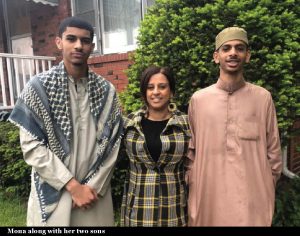YAN – Lackawanna, New York
 As an elected board member of the Lackawanna City School District, Mona Abdulla’s greatest achievement was to secure April as Arab Heritage Month in April of 2019.
As an elected board member of the Lackawanna City School District, Mona Abdulla’s greatest achievement was to secure April as Arab Heritage Month in April of 2019.
She smiled thinking about that moment as it held personal relevance to her own childhood. She recalled a moment in first grade in that same school district. There was such a lack of cultural understanding of Muslim students at that time that Mona was excluded from participating in gym because she refused to wear the required athletic shorts. She recalls, “The gym teacher made me sit down [and] said, you are not prepared.” It took a visit from her father to rectify the situation and this incident resulted in a new policy of tolerance that allowed girls to wear gym pants rather than shorts.
Mona’s journey is one of a second-generation Yemeni-American. She was born just days after her parents arrived in the United States from Beni Bakr on the outskirts of Yafa’. Steel was king in Lakawanna, the home of Bethlehem Steel Company from 1902 to 1983. Her father advanced from being a dish-washer to a worker at the Letchworth Steel Plant. It was in this environment that Yemenis like Mona’s father were drawn to this industrial hub on the banks of Lake Erie.
In the midst of her childhood, her father brought the family back to Beni Bakr for several months in 1986. Mona recalls, “It was really different and we got sick often….I loved the people there, I loved the culture but I just was kind of homesick.” She remembers landing in Aden in the midst of the Cold War era and seeing westerners who she assumed were Americans. “Why are the Americans speaking a different language?” she asked. “They are not Americans, they are Russians,” she was told.
Once back in the United States, Mona grew up with few Arabs in her school. She remembers having to explain her culture to many of her classmates, especially the Yemeni traditions that were obvious, such as the henna designs on her hands. “I looked recently at an old yearbook when there were [around] five Yemenis at the school. Now they make up about forty percent.” Growing up in America, Mona was inspired by traditional female heroines, both fictional and real, such as Amelia Earhart. “My father told me a woman should always be educated and even if she doesn’t grow up to work, she has to have the tools for life.” Her older cousin, Fatima, gave her the advice like an older sister she never had.
Mona spent much of her twenties moving to different parts of the country and her academic aims were just as mobile. She finally returned to Lackawanna and obtained a Master’s in Higher Education Student Services. During a stint with a college, she became embroiled with the events of the Trump Administration. In particular, she was outraged at the Muslim ban and how it was affecting the Yemeni community in Lackawanna. Mona believed much of her adult life that she would have to represent the Yemeni community on a larger level. She was troubled by the fact that Yemenis were being held at the airport, and in some cases, sent back. This was the moment that Mona knew she had to do something. Soon after, Mona’s friend Gamileh Jamil, the former Executive Director of Access of Western New York, encouraged Mona to speak at a rally opposing the Muslim ban. It was the first time that Mona spoke to a crowd of people in this way. “I spoke in front of 2,000 people and I wasn’t nervous….I was so angry and so concerned about our community,” she shared. “We are in America, we have a Constitution and when [actions] go against the Constitution, I do not care if it is the President or someone in the Arab community; whoever it is, I am going to stand up for what is right.”
Mona’s call to action surrounding the protests against Trump’s Muslim ban catapulted her into a desire to be a leader. Combined with her earlier successful bid on the Lackawanna School Board, Mona has cemented her place as a fixture in the Yemeni-American community. With all of her accomplishments, Mona now wants to urge others to be active in the community. “My parents are immigrants and I would love for other women to be able to connect through me and feel power through me,” Mona said. Mona is among a growing number of second generation Yemeni-American women who have found a mission and a voice in support and advocacy for a community challenged by the events unfolding in Yemen and within the diaspora as a whole.












